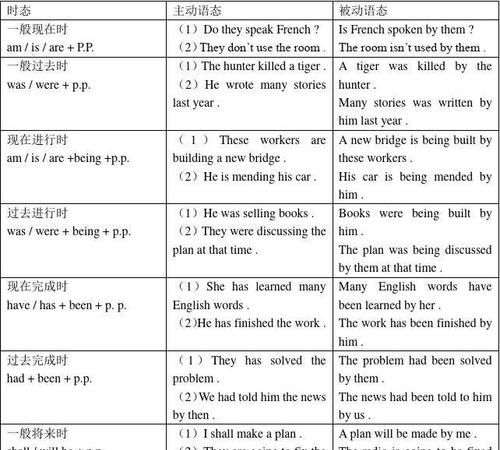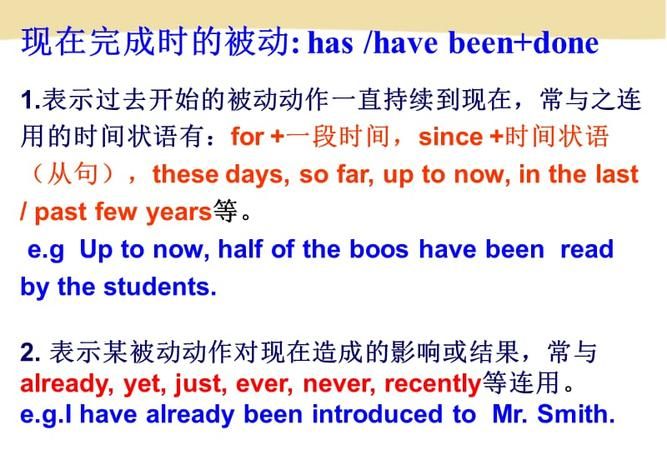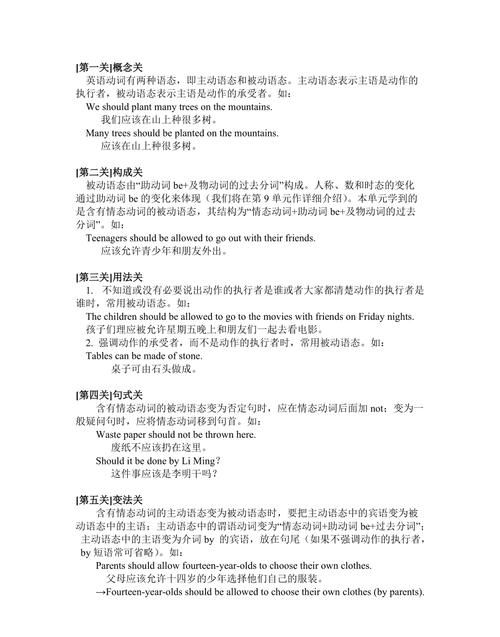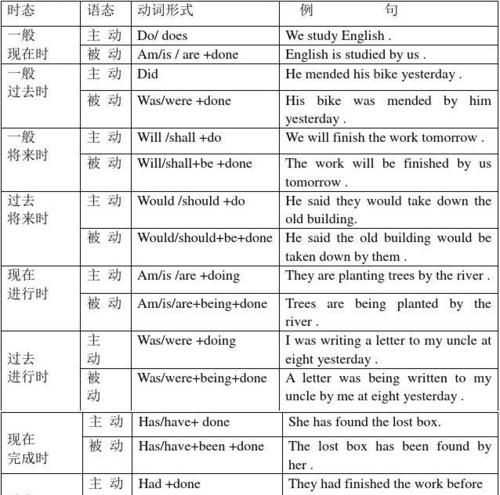本文目录
抄写五个含被动语态的句子并且翻译
下面是被动语态各种时态的例句:e.g. You are wanted on the phone . 有你的电话.(一般现在时) The railway was built in 1998. 这条铁路建于1998 年.(一般过去时) A new railway is being built in this city. 这个城市正在修建一条新的铁路.(现在进行时) The railway was being built this time last year.去年这个时候这条铁路正在修建.(过去进行时) The new railway has already been built.新铁路已经建成了.(现在完成时) The new railway had been built by the end of last year.这条铁路在去年年底前已经建成了.(过去完成时) A new railway will be built in this city next year.这个城市明年将建一条新的铁路.(一般将来时) He told us that the new railway would be built the next year.他告诉我们新铁路将于第二年建成.(过去将来时)第二节 被动语态的各种句型1.单宾语结构. e.g. Our English teacher often uses a tape-recorder in teaching English.我们英语老师经常用录音机教英语.(主动语态) A tape-recorder is often used (by our English teacher) in teaching English.录音机经常用来教英语.2.双宾语结构 这种结构可有两种被动语态句型,即分别用间接宾语和直接宾语作主语.e.g. The villagers gave the foreign guests warm welcome.(主动语态)The foreign guests were given a warm welcome by the villagers.(被动1)A warm welcome was given to the foreign guests by the villagers.(被动2)3.复合宾语结构 这种结构只能将主动语态的宾语改作被动语态的主语. e.g. They heard someone singing in the next room.(主动) Someone was heard singing in the next room. (被动)4. 含情态动词的被动结构 含情态动词的句子其被动语态形式是“情态动词+ be+过去分词”. e.g. The trees should be watered every day. 这些树应每天浇水. This word can be pronounced in two ways. 这个单词可以有两种发音.5.短语动词结构 相当于及物动词的短语动词也可以有被动语态,如 look after, give up , take care of , pay attention to , make use of , put off, wake up , put out 等.e.g. The children must be taken good care of .这些孩子必须得到好的照顾.The big fire has been put out . 大火已被扑灭.特别提醒A. 只有及物动词和及物短语动词才可以有被动语态不及物动词,不及物短语动词或系动词都不可以有被动语态,如happen, go on , take place , belong to , sound, feel等.e.g. This room belongs to me. .这房子属于我.不可以说:This room is belonged to me .e.g. This music sounds sweet.这音乐听起来很悦耳.不可以说:This music is sounded sweet.B.被动语态只有在强调动作的承受者或不知道动作的执行者时才使用.e.g. This sock is made of silk.这袜子是丝的.(不知道动作的执行者是谁.)English is required in many schools of our country.在我们国家许多学校要求开设英语课.(强调动作的承受者English.)C. 千万不能按中文意思死搬硬套,如句子“你的信我已经收到了.”不能说:Your letter has been received by me .只能说:I have received your letter.D. 主动语态变为被动语态的步骤 1.找出主动语态的宾语,作为被动语态的主语;2.将谓语动词有主动形式变为被动形式;3.有无必要用 by 短语.4.注意被动语态的句式,时态必须主动语态一致.e.g. Have you found your lost book? 你找到你丢的书了吗?(一般问句,现在完成时) Has your lost book been found?你丢的书找到没有?(一般问句,现在完成时)E. 有些动词常用主动形式表示被动意义,如动词act, cook, keep , look , open , write, read, sell , wash 等,这时句子的主语通常是没有生命的.e.g. This hall measures 100 metres long and 60 meters wide. 这个大厅长100米,宽60 米. This pen sells well in that country. 这种笔在那个国家很好销.F. 在一些固句型中常用被动语态结构,如:It is said that … 据说……,人们说…… It is reported that … 据报道…… It is hoped that … 人们希望…… It is well known that… 众所周知…… It is believed that…人们相信…… It must be admitted that…必须承认…… It must be pointed that…必须指出的是……

被动语态的例句和原句
以下内容选自奥风英语《中考语法完全突破记忆大纲》
2.被动语态的基本结构:
主语+be
+过去分词(+by+动作的发出者)
①
一般现在时:am/is/are+过去分词
如:
trees
are
planted
every
year.
②
现在进行时
am/is/are+
being
+过去分词
如:
the
road
is
being
repaired.
③
现在完成时
have/has
+
been
+过去分词
如:
the
work
has
been
finished.
④
一般过去时
was/were
+
过去分词
如:
the
story
was
told
by
him.
many
birds
were
killed
last
year.
⑤过去进行时
was/were+
being
+
过去分词
如:
the
new
house
was
being
painted
when
i
got
home.
⑥过去完成时
had
+been+
过去分词
如:
he
told
me
that
the
work
had
been
finished.
⑦一般将来时
will
+be
+
过去分词
如:
the
problem
will
be
discussed
tomorrow.
⑧
过去将来时
would/should
+be
+过去分词
如:
he
said
that
the
christmas
tree
would
be
put
up
soon.
⑨情态动词的被动语态
情态动词+
be
+过去分词
如:
the
problem
must
be
solved
soon.
children
should
be
taught
to
love
animals.

关于被动语态的句子英文
被/可代替的
被动语态
英语中的被动语态使用得比汉语要多,要普遍,许多课本乃至实际应用中都常常涉及到这个问题。一般说来,当强调动作承受者,不必说出执行者或含糊不清的执行者时,多用被动式。须注意的是,许多地方与汉语不同。注意那些汉语中没有"被……"的意思,英语却用被动态。还要注意,英语的被动态往往由"by"引出,而有用介词"by"的短语往往又不是被动态,而是系表结构。还有些待殊现象,如…knownto man(人类......所知),on foot步行(美国人有时用by foot),in carraige(乘四轮马车)等等。还有假主动,真被动的十几个常用词的用法,以及so heavy to carry而不用so heavy to be carried等习惯用法。有关这类情况,做到心中有数对全面掌握被动态,准确无误地解答习题非常关键,被动态必须涉及的是动词的各种时态变化的问题。英语的时态本来很复杂,怎样记住各自的被动形式呢? 首先要明确"将来进行无被动,现在完成进行
同"。这两种时态无被动形式。
另外,不及物动词带有同源宾语的动词,反身代词的动词和系动词都无被动形式。即便如此,还有一般现谑保�话愎�ナ保�衷诮�惺保��ソ�惺保�衷谕瓿墒焙凸�ネ瓿墒?还有不定式,动名词,分词,以及它们的复合结构)的被动态,再加上情态动词,助动词以及它们的疑问式和否定式从中掺杂,真是令人头痛,眼花缭乱。下面口诀就以动词do为例,即do did过去式done过去分词,以口诀形式总结各种时态的被动态,一定对你有所启示。
被动语态的口决
一般现、过用be done,be有人称、时、数变。
完成时态have done,被动将been加中间。
一般将来shall (will) do,被动变do为be done。
将来进行无被动,shall (will) be doing,
现在完成进行同,have (has) been doing。
现、过进行be doing, 被动be加being done。
情、助、有、是妥安排,一律随新主语变。
否定助后加not,疑问一助置主前。
主语恰是疑问词,直陈语序主在前。
一般情助加be done,双宾多将间宾变。
复合宾语宾变主,宾补、主补相应变。
第二句"be有人称、时、数变"即be有人称、时态和单、复数的变化。"情助"是指情态动词和助动词must, may, can, shall, will等一律随新主语(多是主动句中的宾语)来变化。"疑问一助置主前"是说有两个助动词的话,应把主语放在第一助动词之后或把第一助动词置于主语之前。下面详细举例说明之。
一般现、过用be done, be有人称、时、数变
例:主动:The children gave the foreign guests a warm welcome.
被动:The foreign guests were given a warm welcome by the children.
孩子们热烈地欢迎外宾。
主动:People regard him as brilliant.
被动:He is regarded as brilliant by people.
人们认为他很有才华。
以上两例都是一般时态用be done的例子,be有人称、时、数变,第三人称foreign friends是复数,时态一般过去时,所以"be done"就是were given,而People regard him as brilliant一句,被动后的"be done"就变成单数第三人称is regarded的形式了。
被动: This speech was delivered by comrade Wang. (was delivered即一般过去时的被动态)
这篇讲演是王的发言。
There was a serious train accident near the border. Two people were killed and twelve were injured.
边境发生严重列车事故,二人死亡,十二人受伤。
A person who is truly honest is called a straight arrow. 直言不讳的人才是真正诚实的人。
A note was passed up to the speaker. 有人给讲演者递上来一张纸条。
John was elected president of the class instead of Harry. 乔治被选为班长而代替了亨利。
Volcanoes are described as active, dormant or extinct. 火山被描述为活的,沉睡着的,或者死的。
The soldier was killed, but the train was saved. 这位战士牺牲了,然而列车得救了。
He was thought to be clever but dishonest. 他被认为很聪明但不诚实。
The first zoological garden in the United States was established in 1874. 美国的第一个动物园是1874年建立的。
Families were often broken up; wives were taken away from their husbands, and children from their parents. 家庭被拆散,妻儿被夺走。
The information is urgently needed. 急需这个资料。
Most environmental problems exist because adequate measures for preventing them were not taken in the past. 多数环境污染问题的存在,是因为过去没有采取适当的保护措施。
完成时态have done,被动将been加中间。
(过去完成时had done也包括在内)。
例:主动:We have studied English for 3 years off and on at the spare-time school.
被动:English has been studied for 3 years off and on at the spare-time school. (have随新主语变为has)
我们已经在夜校里断断续续地学了三年英语了。
主动: They had produced 100 tractors by the end of last year.
被动: 100 tractors had been produced by the end of last year.
到去年年底我们已生产出一百台拖拉机。
主动:They have set up a power station in their home town.
被动:A power station has been set up in their home town.
他们的家乡建立了一座发电站。
主动:They have warned us to be careful of rats.
被动:We have been warned to be careful of rats.
他们已提醒我们要注意老鼠。
主动:People have piled plastic bags full of rubbish in streets.
被动: Plastic bags full of rubbish have been piled in streets.
人们把装满垃圾的塑料袋子堆放在街上。
主动:We have used nuclear energy to produce ekectricity.
被动:Nuclear energy has been used to produce electricity.
核能已用来发电。
主动: No one has ever beaten him at tennis.
被动:He has never been beaten at tennis.
就网球来说还没有人是他的对手。
(No one涉及到全否定和部分否定问题,见否定一讲)
The person who owns the gun may try to deny that he has used it. But anyone seeing the smoke knows the gun has just been fired.
有枪的人会极力否认他开了枪。但是任何看到枪姻(枪冒的烟)的人都会知道刚才开了枪。
Today is Cilia's wedding day, she has just been married to Danel. 今天是西丽亚的新婚日,她刚刚和丹尼尔结婚。
The subject of these lectures have been announced by the lecture committee. 演讲委员会已宣布了这些讲演的题目。
过去完成时也是一样:
主动: Somenody had cleaned my shoes.
被动: My shoes had been cleaned by somebody.
有人早已把我的鞋子擦了。
When I returned I found that they had towed (toud) my car away, I asked why they had done this and they told me that id was because I had parked it under a "No Parking Sign".
被动:...my car had been towed away. I asked why this had been done and told that ... it had been parked under a "No Parking Sign".
当我回来时,发现我的车被弄走了。我问他们为啥这么于。他们告诉我说因为我把车于停在"禁止停车"的禁区。
主动: They had build three ships by last December.
被动: By last December three ships had been build by them.
到去年年底他们已建造了三艘船。
Research had been centred on the improvement of natural building materials before synthetics were created. 合成材料造出之前,研究工作集中在改进天然建筑材料上。
He did not say if all those steel pipes had been examined. 他并没有说那些钢管都检验过没有。
After plastic had been created, engineers were given a much wide choice of materials. 塑料发明之后,工程师们在材料选择上有了更广阔的途径。
一般将来shall (will) do,被动变do为be done
即由shall do或will do变为shall done或will be done。
例:主动: We shall build several big modern power plants in our city next year.
被动:Several big modern power plants will be built in our city next year.
过年我市将建立几座大型现代化的发电厂。
(shall do中的shall要随新主语变为will, do为be done.)
王动:I shall send my second boy to school next September.
被动:My second boy will be sent to school next September.
过年九月我将送我次子去读书。
主动:In order to fool people cheaps and swindlers will make such bricks out of lead covering the "lead brick" with gold.
被动:Such bricks will be made out of lead covering the "lead brick" with gold by cheaps and swindlers.
设法骗钱的商人和骗子们将通过把"铅砖"外面镀上一层金来做这样的"金砖"。
主动:They will ask you a lot of strange questions.
被动: You will be asked a lot of strange questions.
他们将问你许多怪题。
被动句中的by引出的宾语,一般说来,如果是人称代词你、我、他等,均可省略,some one no one不由by来引出。如果是名词不能省略,但当今英语也都可省略了。
主动:The Chinese people will make more space explorations in the future.
被动:More space explorations will be made in the future by the Chinese people.
中国人民在将来将进行更多的空间探索。
同样
After a period of use, the batteries should be shanged. 电池使用一段时间后,应该更换。
Usually, the electricity is on for 24 hours. But tomorrow it will be cut off in the day time. 通常是昼夜供电,明天白天将停电。
More peaceful uses will be found for nuclear explosives in the future. 在将来会发现更多的和平利用核爆炸的途径。
More hard work will be needed to make this wonder come true in a short time from now. 从现在起要使这些奇迹在短时间内成为现实还需要做更多的艰苦工作。
make...come true 使……成为事实; come true做宾补(见感使动词口诀)。
The machine will not be used again. 这机器不能再用了。
Will more gas be needed? 需要更多的煤气吗?
但如果是一般过去将来时如何处理呢?请记下面口诀:
一般过去将来时,过去某时将发生。
主动should (would) do,被动be done代原形。
将来进行无被动,现在完成进行同。
主动:A few days ago we were still not quite sure whether we should carry out the new plan ahead of time.
被动:...whether the new plan would be carried out ahead of time.
几天前,我们还不能肯定能否提前执行新的计划。
主动:I did not say that we would change the eauipment.
被动:I did not say that the equipment would be changed.
我并没说过,我们将换掉那台设备。
主动:My supervisor told me that he would give me a special tutorial a few days ago.
被动:My supervisor told me that a special tutorial would be given to me a few days ago.
几天前,我的导师说他将对我进行个别辅导。
主动: I never thought that be would bring me the information so early.
被动:I never thought that the information would be brought to me so early.
我决没想到他那么早就会把资料带给我。
将来进行无被动,shall (will) be doing,
现在完成进行同.have (has) been doing,
即将来进行时表示动作在将来某一时刻或某个阶段正在进行'现在完成进行时表示某-行为发生在过去.延续到现在,可能还要延续下去。两种时态则不用被动语态。
例;We hope your comany will soon be sending an engineer over to check this equipment. (将来进行时) 我们希望贵公司早些派一名工程师来检查这台设备。
In a ffew minutes our passenger plane will be flying in the stratosphere. (将来进行时) 几分钟后我们的客机将在同温层中飞行。
We hope scientists will be tapping new energy sources to meet the need for power. 我们希望科学家们将发掘新的能源来满足能量的需要。(将来进行时)
What will you be doing this evening? 今晚你将做什么?(将来进行时)
I have been living in Anshan Since 1980.(现在完成进行时) 1980年以来,我一直住在鞍山。
How long have you been studying English? 你学英语多久了?(现在完成进行时)
We have been waiting at the airport for the whole day becayse of the thick fog. 由于大雾,我们已经在机场等了一整天了。 (现在完成进行时)
Since then, applied mathematicians have been coping successfully with many problems in astronony. 从那时以来,应用数学家成功地处理了许多天文学上的问题。
(现在完成进行时)以上均无被动态。
现、过进行be doing,被动be加being done
即现在进行时或过去进行时都是be的人称、时和数的形式加doing。而被动态则是be加上being done的形式,being是不变的。现在进行时和过去进行时的被动态是被动态个的重点,容易搞错。例如:
主动:The workers are repairing the main building of the Northeast Engineering Institute.
被动:The main building of the Northeast Engineering Institute is being repaired by the workers.
工人们正在维修东北工学院主楼。
Two reserviors are being built at the same time. 两座水库同时建造。
The nasty question is being considered by the committee members. 委员会的委员们正在考虑那个棘手的问题,
A cir(uit d朗i8ni 566inf m6J6bythetR8Incers. 工程师们正搞电路设计。
Equipment and foodstuffs are being flown to the floodstricken areas. 设备和食品正在空运到灾区。
The buildong of another fly-over is being planned. 他们在计划修建另一座跨线桥。
We coudld not get through because the February 19th Road was being repaired. 我们过不去,因二.一九路正维修呢。
详见:***/enyf/yf/200707/13804.html

现在进行时的被动语态例句
现在进行时的被动语态例句:
①The flowers are being watered by me.译:我在浇花。
②The room is being cleaned by my brother.译:我弟弟在打扫房间。
③The book is being read by my father.译:我爸爸在看书。
现在进行时的被动语态结构:
am/is/are+being+动词的过去分词+其它

以上就是关于00句被动语态的句子 ,抄写五个含被动语态的句子并且翻译的全部内容,以及100句被动语态的句子 的相关内容,希望能够帮到您。
